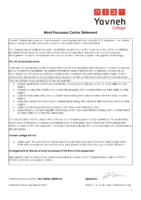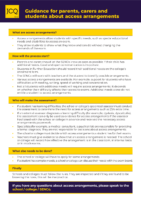SENDCO statement for carrying out assessments for exam access arrangements.
Exam Access arrangements
Access Arrangements are pre-examination adjustments for candidates based on evidence of need and normal way of working. Access Arrangements fall into two distinct categories: some arrangements are delegated to centres; others require prior JCQ awarding body approval.
- The SENDCo currently possesses the required qualification and level of competence as required by JCQ regulations September 2022 to August 2024 and can carry out the required assessments.
- The school may agree to work in conjunction with external assessors who have an established relationship with the Centre and have a proven and up to date understanding and knowledge of the JCQ regulations pertaining to exam access arrangements.
- The decision to apply for access arrangements is Yavneh College, based on evidence of a history of need, current need, history of provision, a student being disadvantaged compared to his/her peers and a specialist teacher’s access arrangements report or medical report from a specialist doctor.
- Subject teachers are also involved in the decision as to whether an exam concession is necessary
Who can carry out assessments:
The Head of Centre is responsible for appointing a specialist assessor who is qualified and has the required level of competence as specified by the JCQ and must ensure that evidence of the assessor’s qualification(s) is obtained at the point of engagement/employment and prior to the assessor undertaking any assessment of a candidate.
- Assessments for a scribe, oral language modifier and extra time must be carried out by an appropriately qualified assessor
- The Head should check the assessor’s qualifications and store the relevant documentation for inspection purposes
- Evidence of the assessor’s qualification(s) must be held on file for inspection purposes and be presented to the JCQ Centre Inspector by the SENCo
Assessor of candidates with learning difficulties
An assessor of candidates with learning difficulties will be an appropriately qualified access arrangements assessor/psychologist/specialist assessor) who:
- has a thorough understanding of the current edition of the JCQ publication Access Arrangements and Reasonable Adjustments and the principles, procedures and accountabilities involved
- is familiar with the Equality Act 2010 (although it is not their role to determine what is a ‘reasonable adjustment’, but rather to help identify access arrangements that might assist the candidate in examinations and assessments and are thus potentially reasonable adjustments)
- either holds an appropriate qualification to teach and make recommendations for secondary aged or adult learners who have learning difficulties or a Health and Care Professions Council Registered Psychologist or Specialist Teacher with the current SPLD Assessment Practicing Certificate as outlined in 3.4
- has an established working relationship with the centre before an assessment, or establishes a working relationship with the centre
- seeks evidence the normal way of working of a candidate
- conducts appropriate assessments to identify the need(s) of a candidate
- provides appropriate evidence to confirm the need(s) of a candidate
- completes appropriate documentation as required by the regulations of JCQ and the awarding body
Private Educational Psychologists’ or other commissioned reports
A parent/carer may wish to have their children assessed by a private educational psychologist and submit the report to the SENDCo as evidence that their child should be awarded extra time or EAA.
- Private educational psychologists’ report cost a significant amount of money which therefore means that parents who are unable to obtain a private report through their financial circumstances are put at a disadvantage
- As an exam centre, Yavneh College must be consistent in its decisions and ensure that no student is either given an unfair advantage or disadvantaged by any arrangements put in place. Therefore, if a report is submitted, we will look for a significant school-based evidence of a history of need
- A privately commissioned assessment carried out without prior consultation with the centre cannot be used to award access arrangements and cannot be used to process an application using Access Arrangements Online
- Where privately commissioned reports do not satisfy the above and/or contradict our school-based assessment and/or evidence of need, the Centre judgement will take precedence and will inform any Exam Access Arrangement decision
- Where a privately commissioned report, or a report from an external professional, is rejected by a centre, the head of centre or a member of the senior leadership team should provide a written rationale supporting their decision to the parent/carer
- No further negotiation regarding this matter will take place with the parent/carer
Where an external assessor has been sought the school ensures the following:
- A relationship with the SENDCo must have been established prior to any assessment
- The external assessor must work with the SENDCo to ensure a joined-up approach
- The SENDCo provides background information, assessment and/or screening results including the normal way of working and school-based evidence of need
- The assessor discusses the arrangements with the SENDCo and that the responsibility to decide upon and request arrangements lies with the SENDCo and not the assessor
- The Centre holds evidence of the assessor’s certificate and evidence that he/she meets the criteria and that this is available for inspection
Where privately commissioned or external reports are accepted:
- The centre (who under JCQ guidelines, is the sole referrer for Access Arrangements) has to have full confidence in the testing that has been undertaken and ensure that testing has been robust and valid
- An application requesting access arrangements will only be made with clear school-based evidence of need recorded in Part 1 of Form 8
Centre regulations for assessment, report writing and applications
- Teaching staff are required to discuss access arrangements with the SENDCo
- SENDCo to recommend appropriate access arrangements (Part 2 of Form 8)
- SENDCo to make applications through Access Arrangements Online
- The decision to approve or not is instantaneous and the SENDCo may refer to the awarding body if not approved
- Candidate evidence of need and normal way of working is kept on file ready for inspection
- Candidate and parents are informed of the decision to award access arrangements
- Arrangements are made for candidates to have practice of the access arrangement(s) in class tests, mock exams and assessments where applicable
- Arrangements are made for appropriate resources/personnel/accommodation for each examination
- Records of access arrangements used are kept using the access arrangement log sheet maintained by the access arrangements facilitator






